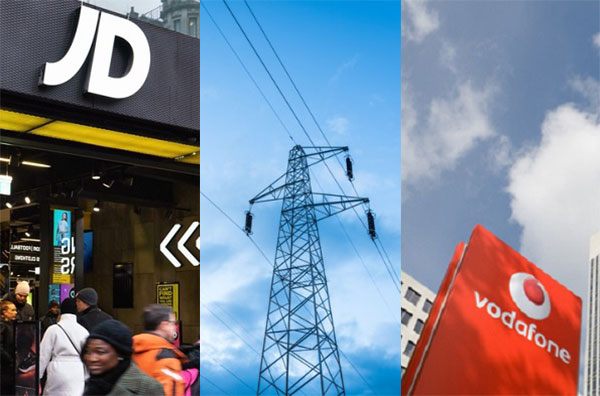Your vote counts: Vodafone, SSE and JD Sports
8th July 2022 09:58
by Graeme Evans from interactive investor
Shareholders get the chance to vote on some hefty pay packets at three FTSE 100 companies, including two income plays and a growth stock.

Vodafone (LSE:VOD) and SSE (LSE:SSE) shareholders are about to have their say on the £4 million-plus pay packages handed to the chief executives of the two FTSE 100-listed companies.
The award to SSE's Alistair Phillips-Davies includes an annual bonus of £1.15 million at a time of spiralling energy and household costs, while Vodafone’s Nick Read got a £1.45 million bonus despite a lacklustre share price performance.
Among other FTSE 100 AGMs taking place this month, JD Sports Fashion (LSE:JD.) faces another challenging meeting after handing a big pay rise to its finance boss. Glass Lewis has recommended shareholders vote against the annual remuneration report, with its other concern being the scale of bonus awards in the wake of government Covid support.
Vodafone
When: 10am, Tuesday 26 July.
Where: The Pavilion, Vodafone House, The Connection, Newbury, Berkshire RG14 2FN.
How to participate: The meeting will be live webcast. Proxy voting instructions must be submitted by 10am, Friday 22 July, with the deadline for questions to VodafoneAGMQuestions@equiniti.com being 6.30pm the same day. More AGM details can be found here.
Who’s in the chair? Jean-François van Boxmeer, who spent 15 years as chief executive of Heineken, was appointed in November 2020.
How did the company do in the year to 31 March? Total revenues increased 4% to 45.6 billion euros (£39.2 billion), driven by service revenue growth in Europe and Africa as well as favourable currency movements. Operating profit increased 11.1% to 5.7 billion euros (£4.9 billion) and basic earnings per share was 7.2 euro cents (6.2p), up from 0.38 euro cents. The total dividend was unchanged at 9 euro cents (7.75p), including a final award of 4.5 euro cents (3.88p) for payment on 5 August.
How have shares performed? Down 5% to 124.8p (127.5p on Thursday).
How much is the boss paid? Nick Read has received his first pay rise since his appointment in October 2018, with the 3% workforce-linked increase taking his basic salary to £1.08 million from the start of July. His total remuneration for 2021/22 came to £4.17 million, which compares with £3.5 million the previous year. The latest figure includes £1.45 million after the annual bonus scheme paid 69.2% of the maximum opportunity. The long-term incentives awarded in 2019 vested at 26.1% of the maximum, generating £1.52 million.
What’s the view of voting agencies? Glass Lewis recommends shareholders vote in favour of the annual remuneration report.
How did last year’s AGM go? The remuneration report was approved with 97.65% of votes in favour.
How’s the company doing on diversity? The board is 50% female. Vodafone says that the 32% of women in management and senior leadership roles is on track for an ambition of 40% by 2030. Having had a non-white director on the board for 18 years until July 2021, the company does not currently meet the Parker review. Vodafone has introduced new ethnic diversity targets to ensure that by 2030, 25% of its global senior leadership will come from ethnically diverse backgrounds compared with 18% currently.
JD Sports Fashion
When: 9am Friday, 22 July.
Where: The offices of Addleshaw Goddard, One St. Peter’s Square, Manchester, M2 3DE.
How to participate: Proxy voting instruction must be returned no later than 9am, Wednesday 20 July. Shareholders wishing to receive a response to a question in advance of this deadline should contact Investor.Relations@jdplc.com by 9am on Friday 15 July. More AGM details can be found here.
Who’s in the chair? Former ASOS finance director Helen Ashton. She is in the role on an interim basis following the departure of executive chair Peter Cowgill in May.
How did the company do in the year to 29 January? Revenues jumped 38.8% to £8.56 billion, aided by reduced trading disruption from Covid-19 and the impact of acquisitions including Shoe Palace in the United States. Profits before tax and exceptional items of £947.2 million were more than double the previous record of £438.8 million in the year to February 2020. The company repaid £24.4 million of support that it received from the Coronavirus Job Retention Scheme in the UK during the year. Earnings per share rose to 7.17p from 4.61p a year earlier, while a final dividend of 0.35p a share is due to be paid on 5 August.
How have shares performed? Up 26% to 188.3p (121p on Thursday).
Why did Cowgill leave? The executive chairman, who re-joined JD Sports in 2004 and oversaw the retailer’s spectacular run of growth, left with immediate effect on 25 May. His departure came after a corporate governance review determined that JD should accelerate previous plans to separate the roles of chair and chief executive. Ashton added: “As our business has become bigger and more complex, what is clear is that our internal infrastructure, governance and controls have not developed at the same pace.”
How much was he paid? His total remuneration for the January 2022 financial year came to £2.4 million, including his annual salary of £863,000. He received a bonus of £1.55 million, which was equivalent to 90% of the maximum opportunity. The award should have been 100% but discretion was used to reduce bonus outcomes by 10% to reflect a fine from the Competition and Markets Authority. He held 9.7 million JD shares at the end of January, but his departure means any unvested share awards have now lapsed.
What’s the current management team being paid? Chief financial officer Neil Greenhalgh has received a 32.4% pay rise to £450,000, on the top of the 13.3% rise the previous year. He also gets a responsibility allowance of £250,000 a year to reflect his enhanced duties during the transition period following Cowgill’s departure. Interim chief executive Kath Smith will receive an annual fee of £1.2 million on a pro rata basis, but no variable pay or benefits. Her previous experience includes as managing director of the Adidas and Reebok brands.
What’s the view of voting agencies? Glass Lewis says it has “severe reservations” about supporting the remuneration report. The agency believes the remuneration committee should have exercised discretion to substantially reduce or eliminate bonus awards due to the receipt of business rates relief and furlough support. It is also unhappy with the quantum of the base salary increases awarded to finance boss Greenhalgh. However, JD believes the package to be fair for a CFO “operating in a business of this size and complexity”.
How did last year’s AGM go? The annual remuneration report got 68.5% support, while 80% of votes were in favour of the binding resolution on the three-year remuneration policy. Following feedback from shareholders, JD said the shares-based element of the chief financial officer’s annual LTIP award will increase for this year from 33% to 50% of the maximum opportunity and that it intends for the award to be delivered wholly in shares in the future.
How’s the company doing on diversity? There are four women on the seven-strong board following May’s appointment of Suzi Williams and Cowgill’s departure. The company also meets the requirements of the Parker review on ethnic diversity.

SSE
When: 12.30pm, Thursday 21 July.
Where: Perth Concert Hall, Mill Street, Perth PH1 5HZ.
How to participate: Shareholders joining via the online platform will be able to watch the meeting, ask questions and vote in real time. Responses to previously submitted AGM questions will be published on 13 July, ahead of the deadline for the receipt of proxy voting instructions at 12.30pm, 19 July. More AGM details can be found here.
Who’s in the chair? Former BP executive Sir John Manzoni was appointed in April 2021.
How did the company do in the year to 31 March? SSE, whose operations span renewables and thermal generation as well as regulated electricity networks, lifted reported operating profits by 41% to £3.8 billion. Adjusted earnings per share rose 22% to 95.4p, within the expected range of 92p to 97p. The final dividend of 60.2p a share for payment on 22 September was increased in line with the 2026 plan, making a full-year dividend of 85.7p.
How have shares performed? Up 20% to 1,748.5p (1,696.5p on Thursday).
How much is the boss paid? The £924,000 salary of chief executive Alistair Phillips-Davies increased by 3% in April. His overall remuneration for 2021/22 came to £4.48 million, the highest annual figure since his appointment in 2013. The pay package included an annual bonus of cash and shares worth £1.15 million, which amounted to 83% of the maximum opportunity to reflect a “strong financial, operational and strategic performance”. The remuneration committee considered the wider cost of living pressures but felt that the reward was reflective of performance and that no discretion was required, having applied downward adjustments three times in the previous five years. The long-term performance share plan resulted in an outturn of 66% of the maximum, generating £1.97 million, after total shareholder returns increased by two thirds in the three years to the end of March.
What’s in the new remuneration policy? The company’s long-term incentive plan is being changed, with the maximum opportunity for the chief executive going up from 200% to 250% of salary. This has been accompanied by the same change in shareholding requirement. SSE said: “Our total remuneration arrangements currently place insufficient emphasis on long-term performance-related pay and a market correction is required. This applies to both the level of awards under the Performance Share Plan and SSE’s share ownership requirements which are both below market.”
What’s the view of voting agencies? Glass Lewis recommends shareholders support the annual remuneration report and the binding vote on the new three-year remuneration policy. On the latter, it said: “We acknowledge the company's rationale regarding encouraging a long-term performance focus. Further, we believe incentive opportunity and total remuneration remains reasonable relative to peers.”
How did last year’s AGM go? The annual report on remuneration was approved with 97.09% of votes in favour.
Is there a climate-related vote? Last year’s AGM established a framework for annual advisory votes on the company’s Net Zero Transition report. If there is a significant vote against the resolution, the company has pledged to hold discussions with shareholders.
How’s the company doing on diversity? The 12-strong board’s gender balance was 50% female at the end of March, dropping to 46% by June following the appointment of John Bason. The company is in line with the Parker Review recommendation on ethnic diversity.
These articles are provided for information purposes only. Occasionally, an opinion about whether to buy or sell a specific investment may be provided by third parties. The content is not intended to be a personal recommendation to buy or sell any financial instrument or product, or to adopt any investment strategy as it is not provided based on an assessment of your investing knowledge and experience, your financial situation or your investment objectives. The value of your investments, and the income derived from them, may go down as well as up. You may not get back all the money that you invest. The investments referred to in this article may not be suitable for all investors, and if in doubt, an investor should seek advice from a qualified investment adviser.
Full performance can be found on the company or index summary page on the interactive investor website. Simply click on the company's or index name highlighted in the article.